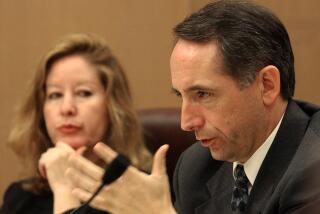Panel Ousts Judge for Lying
- Share via
A Los Angeles County Superior Court judge was kicked off the bench Wednesday by the state judicial commission after it concluded that he repeatedly lied about being a Caltech graduate, a wounded war veteran and a CIA operative in Laos in the 1960s.
The Commission on Judicial Performance ordered the removal of Judge Patrick Couwenberg for willful and prejudicial misconduct, noting that he admitted perjuring himself during the state investigation.
The academic and military experience now known to have been fabricated were critical in Couwenberg’s appointment to the bench by former Gov. Pete Wilson in 1997, the commission said.
“Any discipline other than removal would leave the public paying Judge Couwenberg for a judgeship he apparently procured through misrepresentations,” the commission said.
The finding will become final within 30 days. Couwenberg, however, has up to 60 days beyond that date to ask the California Supreme Court to review the decision, said Victor Henley, executive director of the commission.
“This is a true tragedy,” Edward P. George, the judge’s attorney, said. “He is an outstanding judge. There were over 45 lawyers in support of him before the commission. On the bench he is at the top of the game.”
Couwenberg, 55, who was assigned to the Norwalk courthouse, is the second California judge to be removed this year. The commission ousted Los Angeles Superior Court Judge Patrick Murphy in May for malingering, excessive absenteeism and attending a Caribbean medical school while on the judicial payroll.
The commission launched an investigation into Couwenberg in 1998 after a San Diego judge who was a military veteran read a newspaper profile about Couwenberg and spotted inconsistencies in his life story. Investigators later uncovered a tapestry of falsehoods that the judge had woven throughout his legal career.
Couwenberg, an Orange County resident, swore under oath that he worked in Laos for the CIA in 1968 and 1969 and carried out another covert mission in 1984 while hunting in Africa.
During a five-day hearing this February before a judicial panel, a CIA officer said that the judge never worked for the agency and that, contrary to the judge’s claims, no other government unit was operating secretly in Laos at the time. Also, records showed that at the time of one alleged mission, Couwenberg was working as a county social worker.
The judge acknowledged during the hearing that he was not a Purple Heart-decorated Vietnam War veteran with a shrapnel wound in the groin, that he did not receive a master’s degree in psychology from Cal State L.A., that he never worked for the prominent Los Angeles law firm of Gibson Dunn & Crutcher and that he never attended Caltech or Loyola Law School. Rather, he served in the U.S. Naval Reserve and attended Chaffey College, Cal Poly Pomona and the La Verne College of Law.
He said that he never intentionally provided incorrect information and that inaccuracies on his judicial applications resulted from his wife typing them. He had lied to her about his background decades ago, he said, so she repeated the falsehoods years later. He said other comments he made were jokes. But he still says he was in Laos.
The judge’s attorneys said his conduct did not warrant removal, insisting that he suffered from a psychological disorder.
The condition, known as pseudologica fantastica is said to cause people to mix fact with fiction to protect their self-esteem and is said to be treatable by counseling. George told the judicial panel that his client had the condition because of trauma experienced as a child in Indonesia, where he was born in 1945, as the country sought independence from the Netherlands.
George acknowledged that Couwenberg “made some misstatements.” He added: “He was raised in a concentration camp. For the last five months he has been undergoing therapy.”
During the February hearing, George said Couwenberg did not speak until he was 5 years old, proof of the trauma he had suffered. But the commission seemed unmoved, saying it found no evidence of any mental condition to excuse Couwenberg’s misconduct.
The case has led Gov. Gray Davis to require that all judicial applications be signed under penalty of perjury.
Couwenberg could face consequences beyond losing his seat on the bench. The commission said that he swore to having a master’s degree he did not possess. “At the hearing before the [judges] he basically admitted that was perjury,” the panel said.
More to Read
Sign up for Essential California
The most important California stories and recommendations in your inbox every morning.
You may occasionally receive promotional content from the Los Angeles Times.











